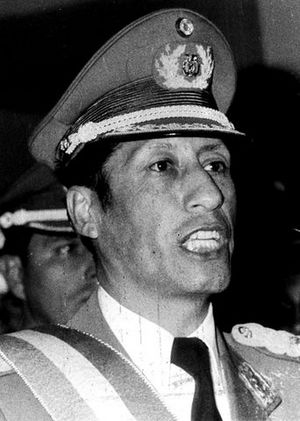Guido Vildoso facts for kids
Quick facts for kids
Guido Vildoso
|
|
|---|---|
 |
|
| 59th President of Bolivia | |
| In office 21 July 1982 – 10 October 1982 |
|
| Vice President | Vacant |
| Preceded by | Celso Torrelio |
| Succeeded by | Hernán Siles Zuazo |
| Minister of Social Security and Health | |
| In office 9 November 1976 – 21 July 1978 |
|
| President | Hugo Banzer |
| Preceded by | Jorge Torrez Navarro |
| Succeeded by | Oscar Román Vaca |
| Personal details | |
| Born |
Guido Hernán Vildoso Calderón
5 April 1937 La Paz, Bolivia |
| Parents | Dilipio Vildoso Rejas Etelvina Calderón Meruvia |
| Education | Military College of the Army |
| Signature | |
General Guido Hernán Vildoso Calderón was a military officer from Bolivia. He was born on April 5, 1937. He served as the 59th president of Bolivia for a short time in 1982. He was the last president chosen by the military in Bolivia.
Contents
Guido Vildoso's Early Life and Career
Guido Vildoso was born in La Paz, Bolivia. This happened on April 5, 1937. He joined the Bolivian armed forces when he was young. He also took special training courses. These courses were in countries like Brazil, Panama, and the United States.
Serving in the Government
In the 1970s, Vildoso worked in the government. He was part of the cabinet for Hugo Banzer. Banzer was a military leader at that time. In July 1982, Vildoso was a high-ranking officer. His fellow military leaders gave him an important job. They wanted him to help the military step down from power. Their goal was to bring democracy back to Bolivia. This happened after a period of unpopular military rule.
Presidency of Guido Vildoso (1982)
Guido Vildoso became the president of Bolivia on July 21, 1982. The country was facing big problems. There was a serious crisis with money and the economy. President Vildoso worked quickly to bring back democracy.
Bringing Back Democracy
Vildoso and other military leaders had two main choices. They could either hold new elections. Or, they could bring back the Congress from 1980. They would then accept the winner of that year's presidential vote. It became clear that new elections would take too long. The country might even fall into a civil war. So, Vildoso's group decided to bring back the 1980 Congress. They promised to accept whoever Congress chose as president.
The New President Is Chosen
Congress met again on September 23, 1982. Their first major action was to confirm the 1980 election results. These results showed that former president Hernán Siles Zuazo was far ahead. On October 5, Congress voted. They chose Siles as the new president by a large majority.
Handing Over Power
Vildoso officially returned the presidential symbols to Congress. This happened on October 10, 1982. This action ended the military's control over Bolivia. Later that day, Siles officially became president. Vildoso and his team were booed by the crowd. But the Bolivian Congress later recognized Vildoso. They thanked him for two important things. He brought democracy back to Bolivia without any fighting. He also helped create the basics of an economic plan. This plan was later used by President Víctor Paz Estenssoro. It helped make the nation's economy strong again.
Life After the Presidency
After giving up power, Vildoso left the military. He now lives in Cochabamba. He is known as the last non-constitutional ruler of Bolivia. This means he was the last leader not chosen by a democratic vote.
See also
 In Spanish: Guido Vildoso Calderón para niños
In Spanish: Guido Vildoso Calderón para niños
- Cabinet of Guido Vildoso
References
- Prado Salmón, Gral. Gary. "Poder y Fuerzas Armadas, 1949-1982."
 | James Van Der Zee |
 | Alma Thomas |
 | Ellis Wilson |
 | Margaret Taylor-Burroughs |

